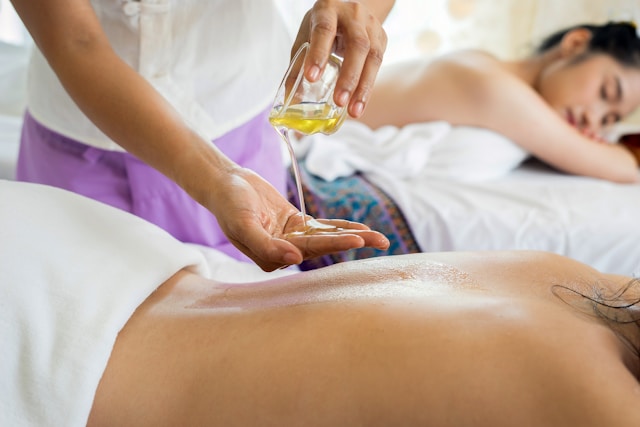Key Takeaways:
- Understanding the diverse array of massage techniques and their respective benefits.
- Examining the multifaceted benefits of massage for mental health, chronic pain relief, and sports performance.
- Massage therapy can be a supportive measure in conventional medical care and can help improve sleep quality.
Table of Contents
- Introduction to Massage Therapy
- Massage Therapy for Stress Relief and Mental Health
- Addressing Chronic Pain with Massage Therapy
- Enhancing Athletic Performance through Massage
- Massage Therapy as a Complementary Medical Strategy
- Massage for Improving Sleep Quality and Fatigue
Introduction to Massage Therapy
There are countless ways our bodies communicate need and healing; sometimes, all it takes is the right touch to elicit a response that leads to better health and wellbeing. Massage therapy, a practiced art for centuries, embraces this concept through skilled touch and has evolved into a robust collection of techniques that address a range of ailments and health goals.
Historically, massage has been linked to ancient civilizations, including Chinese, Egyptian, Greek, and Roman societies, where it was used as a method of pain relief and healing. Even Hippocrates, the father of Western medicine, wrote about the positive effects of ‘rubbing’ to help the body heal itself. Through modern science and a deeper understanding of the human body, today’s massage therapists utilize a rich heritage of knowledge and advanced techniques to provide therapy that supports whole-body wellness. While once considered an extravagance, the benefits are now widely recognized, and seeking out an experienced massage therapist Bowling Green can be just as standard as making a routine doctor’s appointment for many on their journey to wellness.
Massage Therapy for Stress Relief and Mental Health
Today’s fast-paced world often brings with it an overwhelming sense of stress and anxiety. With the increase in recognition of the importance of mental health, many are turning to massage therapy as a means to manage these challenges. The nurturing power of touch provided in a massage session can offer immediate relief from the symptoms of stress, providing a tranquil oasis for the mind to rest and reset. It’s not only the beneficial physical relaxation, but the mental clarity and emotional balance that follow are equally valuable. Massage therapy can be a relaxing addition to standard therapy and medicine for persons suffering from mental health conditions like anxiety or depression.
Addressing Chronic Pain with Massage Therapy
For countless individuals, living with chronic pain is a daily reality. The relentless discomfort can affect all aspects of life, making even simple tasks seem impossible. Massage therapy provides a ray of hope for many such sufferers. Massage, by focusing on specific areas of tension and using specialized techniques, can relieve discomfort, increase range of motion, and drastically reduce pain.
Whether an individual is struggling with neck pain from hours spent at a computer, discomfort from an old athletic injury, or the widespread pain associated with conditions like fibromyalgia, massage therapy can be tailored to address their unique pain points. The relief experienced has been shown to lead to improved sleep, enhanced mood, and overall life satisfaction.
Enhancing Athletic Performance through Massage
Athletes have long known the benefits of including massage therapy in their training regimen. The rigors of training can tax the body, leading to overused muscles that need care. Massage therapy helps alleviate this overuse and can significantly improve recovery time, allowing athletes to train more effectively. By increasing circulation to tired muscles, reducing inflammation, and promoting relaxation, sports massage can enhance an athlete’s overall performance on the field, track, or court.
Another critical aspect of sports massage is injury prevention. By maintaining muscle suppleness and flexibility, massage can help athletes avoid the strains and sprains of pushing a fatigued body too hard. When injury occurs, therapeutic massage can play a central role in the healing process by optimizing tissue repair and relieving pain and stiffness.
Massage Therapy as a Complementary Medical Strategy
As the integration of alternative therapies with conventional medicine becomes more commonplace, massage therapy is often recommended as a complementary treatment. This integrative approach benefits patients undergoing surgery, chemotherapy, or other intense medical procedures. Massage can significantly improve a patient’s comfort and rehabilitation by relieving some of the discomforts and stress associated with typical medical interventions.
Massage for Improving Sleep Quality and Fatigue
Poor sleep quality and fatigue can be debilitating, impacting every facet of one’s life. Massage therapy offers a natural approach for those struggling with insomnia or the general inability to rest well. The relaxation response initiated by massage can prompt deeper, more restorative sleep patterns. This improved sleep has a cascading effect on overall health, reducing fatigue, bolstering the immune system, and improving mental clarity.
By creating a sense of calm and facilitating the body’s unwinding and relaxation, massage therapy can often be the key to unlocking a night of more peaceful and healing sleep.

